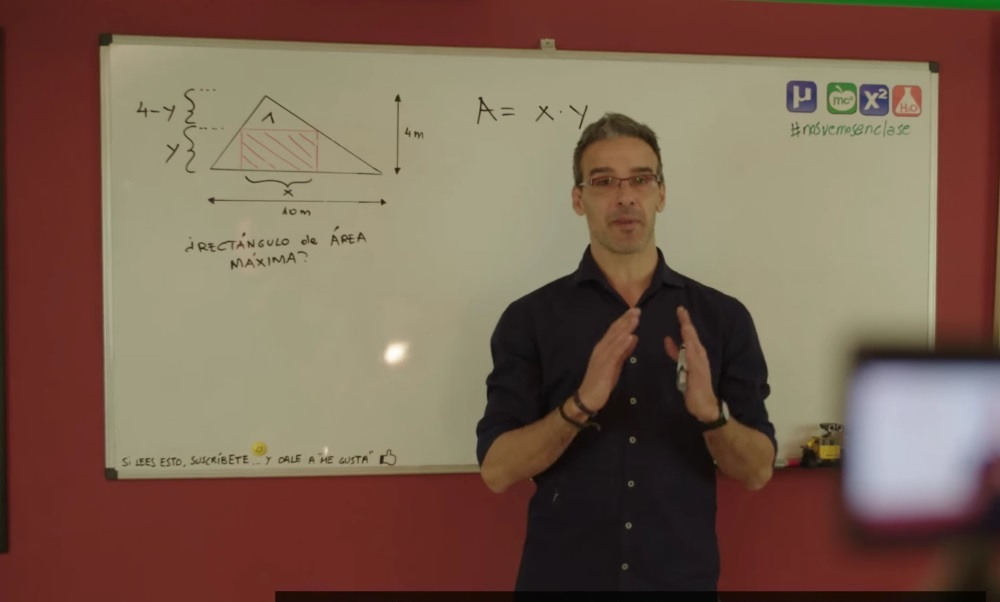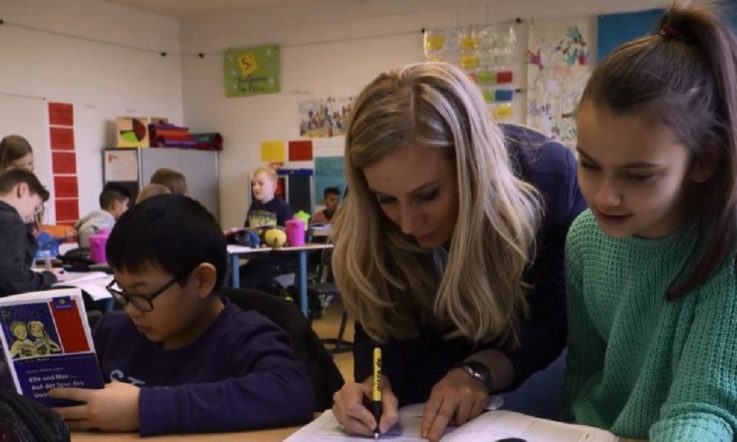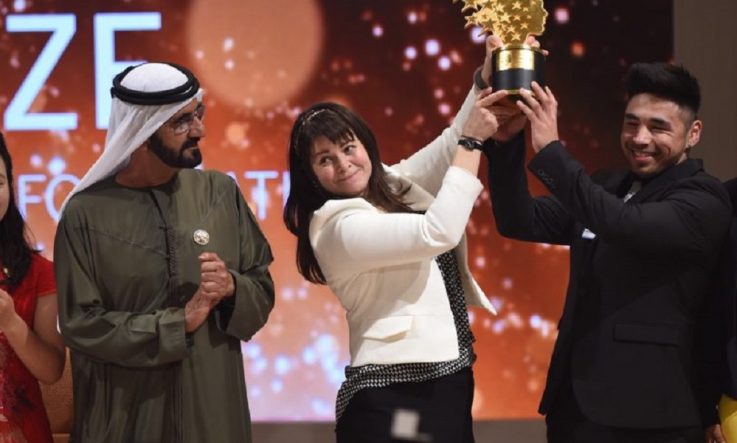Having experienced his own financial struggles as a student, Spain's David Calle understands the hardships many children face when it comes to accessing an education. So a decade ago, he began uploading videos of simple maths lessons to YouTube and they quickly caught on. The videos provide students, many of whom can't afford private tutoring, with additional support beyond the traditional classroom. Calle's unicoos website is considered the most important Spanish-language educational channel in its category on YouTube. Calle spoke to Teacher about the impact his website is having on students and what it meant to him to be shortlisted in the top 10 for the Global Teacher Prize this year. This Q&A has been translated to English from Spanish.
What motivated you to become a teacher?
I was motivated by the suspicion that there was nothing better I could do to change the world than trying to help my students to better themselves, so that they themselves could change the world. The realisation that your work has an impact in your pupil's life and personal development, however small it might be, is simply priceless.
Could you share with me a little about your local context? What is the education system like in your city? What challenges do you face?
I live in a small town in the outskirts of Madrid, populated by middle-class families, with the same problems and difficulties as all of us – they're worried about paying their mortgages and looking to provide their kids with the best educational opportunities possible. In my local context, as is very common elsewhere, almost all students require additional support outside of the classroom, so they can confidently face their exams and, in the best of cases, gain entry to a university.
The biggest challenge is to motivate them to study, to convince them they have the key to their own future and must work hard for it, and to try to inspire in them the energy, passion, work spirit, to help them surpass frustration or despair – it's a challenge that grows every day.
In the video for the Global Teacher Prize, one of your students said, ‘he's not just a teacher in the classroom, he's on WhatsApp … he's there for us 24 hours a day, at any time.' Why is it important to you to be constantly present?
For me, students are the most important thing. There's nothing better I could do to improve the world I live in than to take a stake on them. And I communicate not only through WhatsApp. I dedicate several hours a day to respond to student's queries from all over the world, hundreds of them. It is my responsibility, it is our responsibility.
What motivated you to start recording videos of your lessons?
After almost 20 years of giving lectures in a Support Academy, working all day with my students to tackle their doubts, problems, and exercises, I always came home thinking that the help and support I had provided was not enough; that the time I dedicated to this task was not enough.
In most cases this was because the student's prior knowledge was very low, and kept falling, and they kept forgetting key concepts when they move from one grade level to the next. They also told me it was a shame I could not be with them on the weekends, or the afternoons and nights when they studied alone in their homes. That's why I thought a solution would be to make these videos.
You say you never expected the videos to go viral and be watched by people all over the world. Can you give me a sense of how popular these videos are? How many views do they get?
After six years, the channel has now 900 000 subscribers and more than 110 million visits. We currently receive around five million visits a month. YouTube estimates that more than 20 million students have seen my videos at least once. Worldwide, about half of the visits come from Spain, the rest from Latin America or other countries with Spanish-speaking students.
In regard to the success of the channel, every day I receive kind responses from thousands of students, teachers and families (that is my ‘success' and the best of all accolades). I was also recently elected as YouTuber of the Year in Spain, Google selected unicoos as the channel with the highest social impact on Spain and one of the 25 European channels with highest future potential. Being among the top 10 in the Global Teacher Prize, as unexpected as it was, was the icing on the cake.
How often are you making videos? How do you decide on topics? Are they all different subject areas or are they predominantly mathematics?
I usually upload six to eight videos a month, mostly about Mathematics and Physics.
I also receive a great number of queries each day, so I collect ideas from the queries that have something interesting or special or a different concept I have not previously explained in detail. I also keep in mind dozens of topics I have not shared previously (mainly in Technology and Electronics, since I am an Engineer in Telecommunications) or at other educational levels (university, early secondary). As long as I receive the positive outcomes and support from my unicoos students and don't run out of markers, I'm not going to stop.
On that topic, what feedback have you had from students and teachers? What impact are the videos having?
I've received every type of response, but overall they are of affection and support. They tell me unicoos helps them improve themselves; it has allowed them to achieve their dreams; it has supported them to keep studying and not give up; that they have finally seen a solution to their problems or even start to appreciate and love the sciences.
In a lot of cases they share their successes and failures. Sometimes they also tell me how their lives or their family's lives have changed. For example, recently I received a message from a girl in Guatemala who told me the money her father saved by not sending her to extra-curricular lessons allowed him to build a well to provide water to her town. With comments like these, it's impossible to stop.
Do you have any plans for unicoos in the near future? What's next?
My plan is to keep growing to help the greatest number of students possible. My dream is to be able to hire other teachers to make more videos (with a wider variety of topics and themes) and turn unicoos into a platform that supports teachers to practice a flipped classroom.
This way teachers might be able to direct students to use our website, or send them videos to be watched at home. They could then control and monitor the videos their students have watched, the time dedicated to the task and the grades they have received in the self-assessment tests. It would be a great milestone for our project. In the long term, I'm also struggling to include Spanish subtitles with the videos (for hearing-impaired students) and also into other languages. Of course, the content will always be free. I am convinced that if we give all students the same opportunities, the world will have a chance.
You made the 2017 top 10 finalists for the Global Teacher Prize. What impact has this had on your life?
It has been a great honour but also a great responsibility because you are suddenly turned into a point of reference to a large number of teachers. Trying to highlight the value of the teaching profession and be able to serve as inspiration to fellow colleagues has turned into a crusade for me since making the shortlist for the prize.
On the other hand, I only consider myself as one more teacher among millions, with the sole purpose of helping my students as much as possible and in the best way I can. The outpouring of messages of support I've received since the prize, along with the experience of travelling to Dubai for the award ceremony, is something I will always cherish.
This interview has been translated to English from Spanish.
Do you use the flipped classroom approach in your lessons? Do you produce your own videos or do you source them from other platforms? How do you decide which videos are best to use?
Think about your own schooling experience: did you have an inspirational teacher that had a positive impact on your life? In what way?



